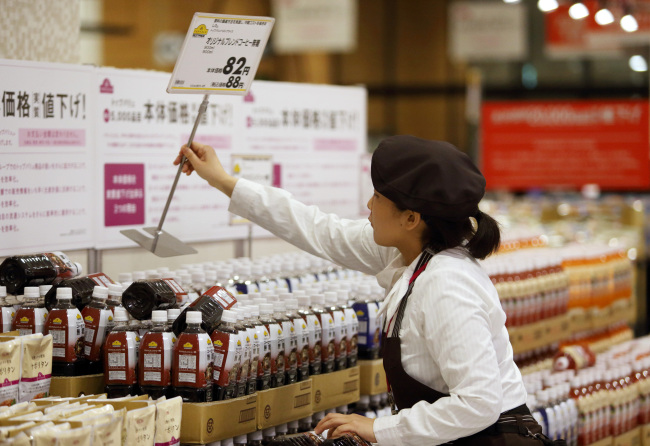Japanese shoppers see first sales tax rise in 17 years
By Korea HeraldPublished : April 1, 2014 - 21:06
TOKYO (AFP) ― Prices rose across Japan Tuesday as a controversial sales tax rise came into effect, with everything from beer to washing machines costing more, sparking fears a drop in consumer spending will derail a nascent economic recovery.
Tokyo agreed to hike the levy to 8 percent from 5 percent as it looks to control a public debt mountain, but corporate Japan’s concerns were highlighted by a closely watched survey of business sentiment showing bosses are cautious about the future.
In a country beset by years of deflation, critics warn that already thrifty shoppers would snap their wallets shut. The last time Japan introduced in a higher sales levy, in 1997, it was followed by years of deflation and tepid growth that defined the country’s protracted slump.
Tokyo agreed to hike the levy to 8 percent from 5 percent as it looks to control a public debt mountain, but corporate Japan’s concerns were highlighted by a closely watched survey of business sentiment showing bosses are cautious about the future.
In a country beset by years of deflation, critics warn that already thrifty shoppers would snap their wallets shut. The last time Japan introduced in a higher sales levy, in 1997, it was followed by years of deflation and tepid growth that defined the country’s protracted slump.

Among those waking to the higher prices was 18-year-old university student Hibiki Ishida, who was not impressed when he bought his favorite chewing gum during Tokyo’s morning commuter rush.
“I get this gum every morning and I know the price is 120 yen ($1.15),” he said.
“But I handed 120 yen to the shop clerk today and she told me it was now 123 yen ― that unnerved me.”
Others, like 20-year-old graduate surnamed Yoshida ― who is set to start a new job and live on her own ― has been planning for the hike, with some help.
“I haven’t felt the price rise because I haven’t bought my subway commuter pass yet,” she said.
“But my mother has given me lots of daily stuff like tissue paper and plastic cling wrap ... so I can survive for the time being.”
The rise has presented a huge challenge for Prime Minister Shinzo Abe since he swept to power in late 2012 on a ticket to drag the world’s No. 3 economy out of a cycle of falling prices and tepid growth with a policy blitz.
On Tuesday, defending the rise ― which could be followed by another, to 10 percent ― Abe pointed to spiraling health care and social welfare costs which are straining the public purse in a rapidly aging society.
The tax rise “is meant to offset increases in social security costs over the years and to maintain the country’s trust,” he told reporters, adding that he would press on with a bid to defeat years of growth-sapping deflation.
But a Kyodo news agency poll earlier this year said about three quarters of Japanese people were feeling no impact from the premier’s growth efforts, which included an unprecedented monetary easy program by the Bank of Japan that helped sharply weaken the yen and boost profits at Japanese firms.
On Tuesday, a closely watched BOJ survey showed that business confidence soared to a more than six-year high in the January-March quarter as the economy shows signs of picking up.
However, company bosses appear cautious about the future as the survey of more than 10,000 firms pointed to lukewarm investment and slumping sentiment for the April-June quarter.
“Firms are cautious about the future course of the economy as the impact of the tax hike remains uncertain,” said Hideki Matsumura, an analyst at Tokyo’s Japan Research Institute.
While Toyota, Panasonic and other major firms are boosting wages for the first time in years, Japan’s exports are still struggling and factories logged a surprising drop in February output.
Tokyo’s efforts to stoke lasting inflation appear to be taking hold which, together with higher prices due to the tax rise, has exacerbated concerns that the economy could lose its momentum.
-
Articles by Korea Herald

















![[KH Explains] Hyundai's full hybrid edge to pay off amid slow transition to pure EVs](http://res.heraldm.com/phpwas/restmb_idxmake.php?idx=652&simg=/content/image/2024/04/18/20240418050645_0.jpg&u=20240418181020)

![[Today’s K-pop] Zico drops snippet of collaboration with Jennie](http://res.heraldm.com/phpwas/restmb_idxmake.php?idx=642&simg=/content/image/2024/04/18/20240418050702_0.jpg&u=)